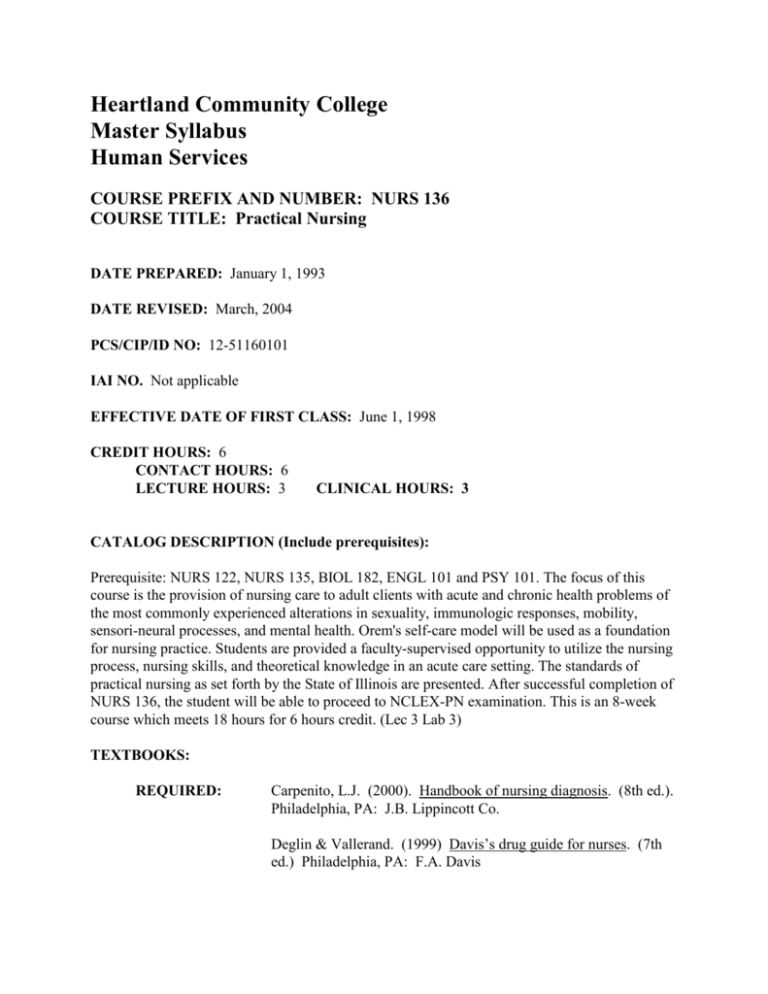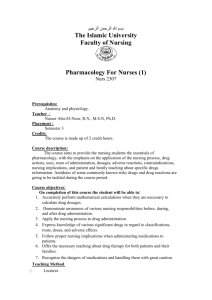NURS136_Mar2004 - Heartland Community College
advertisement

Heartland Community College Master Syllabus Human Services COURSE PREFIX AND NUMBER: NURS 136 COURSE TITLE: Practical Nursing DATE PREPARED: January 1, 1993 DATE REVISED: March, 2004 PCS/CIP/ID NO: 12-51160101 IAI NO. Not applicable EFFECTIVE DATE OF FIRST CLASS: June 1, 1998 CREDIT HOURS: 6 CONTACT HOURS: 6 LECTURE HOURS: 3 CLINICAL HOURS: 3 CATALOG DESCRIPTION (Include prerequisites): Prerequisite: NURS 122, NURS 135, BIOL 182, ENGL 101 and PSY 101. The focus of this course is the provision of nursing care to adult clients with acute and chronic health problems of the most commonly experienced alterations in sexuality, immunologic responses, mobility, sensori-neural processes, and mental health. Orem's self-care model will be used as a foundation for nursing practice. Students are provided a faculty-supervised opportunity to utilize the nursing process, nursing skills, and theoretical knowledge in an acute care setting. The standards of practical nursing as set forth by the State of Illinois are presented. After successful completion of NURS 136, the student will be able to proceed to NCLEX-PN examination. This is an 8-week course which meets 18 hours for 6 hours credit. (Lec 3 Lab 3) TEXTBOOKS: REQUIRED: Carpenito, L.J. (2000). Handbook of nursing diagnosis. (8th ed.). Philadelphia, PA: J.B. Lippincott Co. Deglin & Vallerand. (1999) Davis’s drug guide for nurses. (7th ed.) Philadelphia, PA: F.A. Davis Dudek, S. G. (2001). Nutrition handbook for nursing practice. (4th ed.). Philadelphia, PA: J.B. Lippincott Co. Fishbach. (2000) A manual of laboratory and diagnostic tests. (6th ed.) Philadelphia, PA: J.B. Lippincott Co. Kee & Hayes. (2000). Pharmacology: A nursing process approach. (3rd ed.). Troy, MO: Harcourt Health/Saunders. Mosby. (1998). Mosby’s medical, nursing, and allied health dictionary. (5th ed.). St. Louis, MO: C.V. Mosby Co. Perry & Potter. (2001) Clinical nursing skills and techniques. (5th ed.) St. Louis, MO: C.V. Mosby Co. Radcliff & Ogden. (1999) Calculation of drug dosages w/cd. (6th ed.) St. Louis, MO: C.V. Mosby Co. Smeltzer, S. C. & Bare, B. G. (2000). Brunner and Suddarth’s textbook of medical-surgical nursing. (9th ed.). Philadelphia, PA: J. B. Lippincott Co. Varcarolis, E.M.. (1998). Foundations of psychiatric mental health nursing. (3rded.). Troy, MO: Harcourt Health/Saunders. Wong, D. L. (2001). Wong’s essentials of pediatric nursing. (6th ed.). St. Louis, MO: C.V. Mosby Co. RECOMMENEDED: Boyer. (2000). Study guide to accompany Brunner and Suddarth’s medical-surgical nursing. (9th ed.). Philadelphia, PA: J. B. Lippincott Co. Murphy. (2001). Study guide forWong’s essentials of pediatric nursing. (6th ed.). St. Louis, MO: C.V. Mosby Co. RELATIONSHIP TO ACADEMIC DEVELOPMENT PROGRAMS AND TRANSFER: NURS 136 fulfills 6 semester hours of credit in the practical and associate degree programs. This course meets the philosophy Illinois articulation policies, which would enable the student to transfer this course to one of similar composition in an undergraduate program. However, students should check with an academic advisor for information about its transferability to other institutions. COURSE OBJECTIVES (Learning Outcomes): Students who successfully complete NURS 136 should be able to: 1. 2. 3. 4. 5. 6. 7. 8. 9. utilize effective communication in the provision of care to individuals with acute and chronic health problems. incorporate components of the nursing process according to Orem with emphasis on provision of care to individuals with acute and chronic health problems. implement technical skills of the practical nurse related to individuals with acute and chronic health problems. apply roles of the practical nurse with in the parameters of legal practice. incorporate cultural variations in delivery of care to individuals with acute and chronic health problems. use teaching/learning concepts to enhance self-care ability of individuals with acute and chronic health problems. employ professional behavior with in the scope of the practical nurse in the clinical setting with individuals with acute and chronic health problems. apply critical thinking skills in the psycho-social assessment of individuals with acute and chronic health problems. use self to maximize learning in the care of individuals with acute and chronic health problems. COURSE/LAB OUTLINE: Unit I Unit II Unit III Unit IV Unit V Unit VI Workplace Communication/Illinois Nurse Practice Act Assessment and Nursing Care of Clients with Alterations in Immunologic Responses Assessment and Nursing Care of Clients with Alterations in Mobility Assessment and Nursing Care of Clients with Alterations in Sensori-neural Processes Assessment and Nursing Care of clients with Alterations in Sexuality Assessment and Nursing Care of Clients with Common Alterations in Mental Health METHOD OF EVALUATION (Tests/Exams, Grading System): Students must achieve a “C” grade or better for satisfactory completion of a nursing course taken at Heartland Community College. The grading system will be as follows: A = 90-100% B = 81-89% C = 75-80% D = 70-74% F = Below 70% Theory consists of four exams each worth 20% of the grade, a final exam worth 20% of the grade. Clinical grades will consist of satisfactory (S) or unsatisfactory (U). Students MUST pass both the theory and lab/clinical portion of the course. If a student passes the theory portion with a 75% or better but performance is unsatisfactory in the lab/clinical area, the student will receive an “F” for the course. If the student's performance in the clinical area is satisfactory but theory average is less than 75%, the student will receive a “D” or an “F” for the course. REQUIRED WRITING AND READING: Process recording on assigned client as required by clinical instructor. Nursing care plans on assigned clients as required by clinical instructor. Self-evaluation of the clinical experience. Journal article review. Read all assignments and handouts before class.







